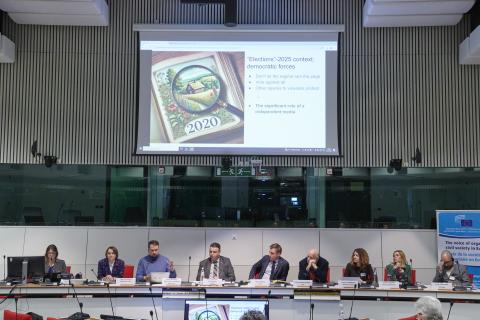On 13 December 2024, the European Economic and Social Committee (EESC), the European Endowment for Democracy (EED) and Press Club Belarus jointly organised a seminar on the role of Belarusian independent media in fostering a resilient and democratising society. Being the only source of information for people in the country, Belarusian independent media need to be supported financially and be involved in partnerships with western media to keep Belarus high on the news agenda.
By taking part in the ‘Belarus Days’ initiative (9-13 December 2024), organised by the European External Action Service and the Commission’s Directorate-General for Neighbourhood and Enlargement Negotiations, the EESC demonstrated its unwavering commitment to a democratic Belarus that respects human rights and freedom of speech.
The series of events organised by the EU institutions aim to keep Belarus high on the EU agenda ahead of the so-called presidential election to be held in the country on 26 January 2025.
The screening of the documentary Under the Grey Sky portraying Katsiaryna Andreeva, a jailed Belarusian journalist, attended by the film’s director Mara Tamkovich, concluded the seminar.
EESC President Oliver Röpke, opening the event, said: ‘Independent media are the backbone of a free and democratic society. Today, as part of Belarus Days, we reaffirm our solidarity with the Belarusian people and their courageous fight against disinformation and oppression. Their resilience inspires us all to continue supporting the struggle for truth, freedom and human rights.’
Reporters Without Borders named Belarus the fourth biggest jailer of journalists in the world, and the repression is likely to worsen as the presidential election in January is approaching. The situation has forced hundreds of journalists and media workers to relocate.
EED Executive Director Jerzy Pomianowski stressed: ‘The result of the election on 26 January is predetermined, and the regime will try to turn the page, try to legitimise itself in international affairs and whitewash the oppression and the absence of the rule of law and civic rights. However, independent Belarusian media seem to be successful in engaging their audience. Research shows that the top five independent media outlets have a similar audience as the Russian media, which shows the important role that media can play. We are working hard to mobilise funding for media, which is in need of financial support and is facing multiple risks.’
At least 5000 websites, social media platforms and media outlets have been labelled as ‘extremist’ and almost all independent media companies are banned in Belarus. This means that people need virtual private networks (VPNs) or other tools just to access them.
Hanna Liubakova, a freelance journalist in exile who was sentenced to 10 years in jail in absentia on four criminal charges, finds the Belarusian people’s motivation to stay informed and have access to independent media thrilling, highlighting that 50% of the traffic for Belarusian-run websites located outside the country comes from inside the country. She confirmed that up to 90% of the social media platform audience is inside Belarus.
Ms Liubakova underlined that the challenge is to reach people who do not follow the news, like younger audiences or those too afraid to engage. That is why they created lighter, more accessible content. ‘Independent media in Belarus is the best antidote to Lukashenko’s and the Kremlin’s propaganda,’ she added.
When comparing the information space in Russia to the one in Belarus, things are very different, as Russian propaganda is militarised and messages are very clear. In Belarus the situation is confusing, conflicting and people do not understand what is really happening as there is no clear enemy.
Natalia Belikova, who works for Press Club Belarus and is the CEO of the Belarus in Focus Information Office, said that the aim of the government’s new propaganda is to provide a new understanding of what elections are, so they are trying to unite people and encourage them to show their patriotism. ‘Such tactics are how they change the entire population’s perception about what democracy is,’ said Ms Belikova.
The new alarming trend emerging these days in Belarus is the instrumentalisation of influencers
and lifestyle bloggers to become part of the Belarusian propaganda, as they have gained the trust of diverse audiences by replacing the news on TV or in the press in recent years.
Serge Sakharau, Chief Editor of the City Dog media outlet, explained that lifestyle topics and bloggers attract a neutral Belarusian audience, detached from the political agenda, as Instagram and TikTok are more infotainment platforms, where entertainment comes first and information second.
To address this situation, especially when children and teenagers are exposed to this trend, Mr Sakharau proposed collaboration and synergies between big lifestyle media and smaller media outlets to help them become sustainable, more popular and visible so that they could counteract the government propaganda.
Concluding the event, Laurenţiu Plosceanu, EESC Vice-President for Communication, underlined the power of independent media to counter fake news and propaganda and reaffirmed the EESC’s support for independent media outlets as they form a shield against disinformation and propaganda.
